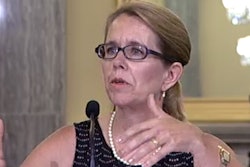 The Obama administration is asking for mandatory detention pay at a rate of at least minimum wage.
The Obama administration is asking for mandatory detention pay at a rate of at least minimum wage.Could driver pay reform and a resolution to require unpaid detention time at shippers and receivers make its way into the next highway bill?
If the Obama administration’s bill, released this week, becomes law, then drivers may be able to get paid at least the federal minimum wage for on-duty time spent not driving.
The Obama administration — specifically, the Department of Transportation and Secretary Anthony Foxx — was the first to the table this year with a highway reauthorization bill. Foxx unveiled the full text of the bill this week and announced plans to send it to Congress.
The Grow America Act’s length and amount have been known for some time, as President Obama announced his plan for pro-growth business tax reform as means to fund a four-year, $302 billion spending bill in February. The plan was also the subject of a recent bus tour by Foxx, who visited locations in eight states to push the plan and urge citizens to contact their members of Congress to tell them to get to work on a highway bill.
The bill is far from becoming law. It still must pass the Senate and the House to be enacted, which is a tall order, especially in the Republican-controlled House. But it does bring some interesting truck-related issues to the table.
Chief among the bill’s provisions for truck operators is its driver compensation reform. If passed, it would allow the DOT to require carriers to pay drivers for time spent on-duty but not driving, such as time detained at shippers and receivers. Compensation for this time would be “at no less than the federal minimum wage,” according to the DOT’s analysis of the bill, released alongside the bill’s text April 29.
Unpaid detention time “often results in pressure for drivers to drive beyond the federal hours of service limits, as a matter of economic necessity, risking driver fatigue and jeopardizing highway safety,” the analysis reads.
The requirement, however, appears to apply only to carriers and company drivers, not owner-operators, shippers or receivers, so the measure wouldn’t necessarily affect detention pay for owner-operators.
The Owner-Operator Independent Drivers Association supports the measures to pay drivers for detention time, but it says any legislation should ensure “that all truck drivers are compensated for all of their on-duty time.”
***
Other provisions in the DOT’s bill
New Entrant Audits: The Grow America bill builds upon the MAP-21 requirement that FMCSA implement new training and testing procedures for “new entrants,” that is, first-time carriers and brokers applying for authority. The bill would allow FMCSA to change the way it audits new carriers, allowing the agency to audit where it deems it would get the most safety value.
Electronic logging device recall actions: The bill gives some regulatory authority to FMCSA over ELD providers, allowing the agency to require ELD providers to send recall notices to purchasers if necessary.
Replacing the Highway Trust Fund: The bill would do away with the Highway Trust Fund and replace it with a similar Transportation Trust Fund. It would be funded with revenue from business tax reform, along with the taxes already collected for the Highway Trust Fund, like fuel taxes.
Tolling: As covered in Overdrive‘s April 29 article about the bill’s announcement, Grow America would allow states to toll existing Interstate lanes as a means to bolster highway reconstruction spending. Tolling of existing Interstate lanes is currently prohibited by federal law. The bill analysis says that tolling implementation would have to be approved by the DOT. Trucking groups like the Owner-Operator Independent Drivers Association and the American Trucking Associations, along with groups like Alliance for Toll-Free Interstates, blasted the bill for its tolling provisions.
OOIDA Executive Vice President Todd Spencer says his group “would advise Congress to refrain from advancing negative provisions in the proposal, including those that would create a patchwork of state-controlled roads,” referencing the bill’s tolling language.
Click here to see Overdrive coverage of the bill’s April 29 release.









